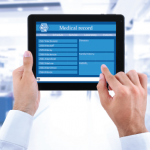There is a high prevalence of copying at academic centers as well. A survey conducted at two large, academic-affiliated hospitals revealed that 90% of the internal medicine and pediatrics residents and faculty who wrote notes electronically used the copy-and-paste function. Although 71% of these physicians agreed that notes written using the copy-and-paste function had inconsistencies and outdated information, a much smaller percentage of these physicians felt that it led to more confusion in patient status or course (27%) or was more likely to lead to a mistake in patient care (25%). The majority of physicians (82%) wanted to continue to use the copy-and-paste function.3
Copy and paste is also commonly used by attendings and residents in the intensive care unit (ICU). A study performed at an urban academic medical center with a 14-bed medical ICU found that copying occurred in 82% of all resident notes and 74% of all attending notes. Residents copied more frequently, but attendings copied more information between notes.4
Although EMRs are meant to enhance communication between providers, there is a fear that they are now overwhelming repositories of data that may be used to expand documentation for billing purposes. In 2012, the Obama administration issued a warning letter to chief executive officers, addressing the concerns around false documentation and potential “cloning” of medical records to receive higher reimbursements.5 Although the American Medical Association (AMA) does not comment specifically on plagiarism or “cloning” in EMRs, they do advise physicians to “make no intentional misrepresentations to increase the level of payment they receive or to secure non-covered health benefits for their patients.”6 Interestingly, a recent study found no evidence that hospitals were using EMRs to increase their Medicare reimbursements.7
We need professional standards for the use of the cut-and-copy function in EMRs. Such standards will need to address some challenging questions, including:
- Is it ethical to copy others’ medical documentation?
- Is it acceptable to self-plagiarize medical documentation?
- Is self-plagiarism more acceptable than plagiarism?
- Are there certain circumstances when self-plagiarism or plagiarism would be considered appropriate, and others when it is inappropriate?
Regardless of what guidelines or standards are developed in the future, it should be expected that all information that is “borrowed” from other sources be carefully reviewed and edited for accuracy. When extensive information is copied from another source, it may be best to provide attribution.
There is little doubt that EMRs can have a beneficial role in medical care. However, we must be careful not to use (or abuse) EMRs in a way that compromises patient care or diminishes trust in the medical profession.


